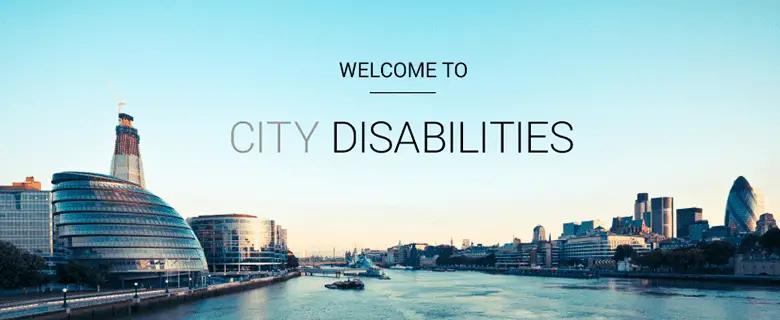
City disabilities: building a career
Building a career in any profession can be difficult. The rewards are great, but it’s not without its challenges too. For employees who live with a disability or long term health condition, the struggle to succeed in their chosen career is considerably greater, and some may give up altogether, or even before they have started.
There is a peculiar species of snobbery about disability. When a person is intelligent and articulate, it’s easy to assume that they find their disability somehow less of an issue; if they can hold down a well-paid job, things surely can’t be that tough. Similarly, if someone is intelligent and articulate, it’s equally easy to assume they are enlightened and free of stigmatic attitudes towards disabled colleagues. What City Disabilities has found is that very often this could not be further from the truth.
Employers in London are well aware of their responsibilities towards employees with disabilities. Many of them actively promote diversity and inclusion programmes and have encouraged the establishment of disability support groups and committees. This can be of great value as a forum to discuss and improve the experiences of disabled professionals. While this is to be encouraged, often the problem lies not in organisations implementing policies, but in putting them into practice. We have found that it is still common for an employee with a disability to face assumptions and prejudices in the work place that are inappropriate, unfair and hard to deal with. Few people actually think they are disablist, despite showing real prejudice. Creating an enlightened workplace is a real challenge.
Helping both employers and employees to challenge these assumptions and improve the working lives of disabled professionals is the reason that Robert Hunter, Kate-Rees Doherty and Kayleigh Farmer set up City Disabilities. Robert is a partner at a major city law firm, and also happens to be profoundly deaf, so it’s no surprise that he determined to challenge stigmatic and complacent attitudes towards employees with disabilities.
Robert knows from experience that many disabled professionals will have been marginalised at some point at work, and however this has occurred, each experience is significant. He also firmly believes that meeting people with first-hand experience of the same issues is important: “If you experience racism or sexism within the workplace, it is easy to walk down the corridor and find a colleague who has faced the same issues at some point in their career” says Robert. “You can share stories, consider the issues and work out the best way to tackle them, knowing all the time that others have been through what you are dealing with, and will lend you moral support. However difficult your problem might be, you have a very real sense that you are not alone.”
This, explains Robert, is not the case for those who suffer prejudice due to a disability. Published statistics show that it is rare for there to be two employees with disabilities in the same department or group, and even if there is, the experience of disability is not universal. The issues faced by someone who cannot hear are significantly different from those of a wheelchair user. The mere fact that they are both “disabled” does not automatically create a common experience or camaraderie. For most disabled professionals, the issues they face are unique and isolating.
City Disabilities offers a solution in a number of ways. First, we provide support through a mentoring scheme. This puts people with experience of dealing with disabilities or medical conditions in touch with others who will benefit from it. Wherever possible we match the mentor to the mentee so that they have a good understanding of the particular disability in question and the challenges that come with it. Secondly, we share our experiences with younger entrants to London careers, by supporting them through the process of job applications, interviews and beyond. Where possible we put them in touch with people who have first-hand experience of the professions and organisations that they might want to join. Thirdly, we pool information from our members and share it with employers who want to develop “best practices” for working with employees with disabilities and work affecting medical conditions.
It is still early days for City Disabilities. We are a new charity, and have just taken on our first employee. Nonetheless we have already had significant interest in our support services, and the stories we hear of prejudice and misunderstanding in London institutions confirm that there is much to be done. Our goal is to make the professional workplace in London a fairer and more human place for disabled professionals who wish to pursue a career there, and to assist employers in making the most of their disabled professionals, who are a wealth of intelligence, talent and loyalty.
If you have faced any of these issues at work and would like to discuss them, then get it touch with City Disabilities via our website (www.citydisabilities.org.uk). Equally if you have experience and knowledge that you’d like to pass on as a mentor, we’d love to hear from you. We often find that the experience of mentoring is as valuable and informative for the mentor as it is the mentee. We are also interested to hear from those who have forged careers London whilst living with a disability, and those whose daily work involves assisting those professionals. Together we can pool resources, share experiences, and improve the working lives and aspirations of the many professionals in London who live with disabilities and long term health conditions.
Check out…
• Building a business around your disability
• Employment and disability: doing the obvious in 2015!
• Employment and disability: advantages of being disabled
Get in touch by messaging us on Facebook, tweeting us @DHorizons, emailing us at editor@disabilityhorizons.com or leaving your comments below.
Originally posted on 19/02/2015 @ 12:30 am